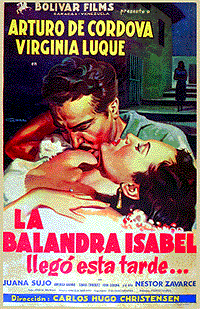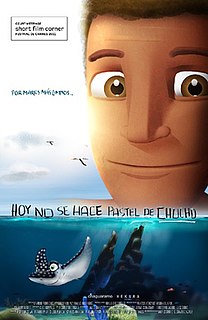
El Pez que Fuma is a 1977 Venezuelan film directed by Román Chalbaud. The film takes place in La Guaira, in the titular brothel. It is considered by many to represent a high point in Venezuelan cinema, and was made during the Golden Age of Venezuelan cinema.

María Dolores Dueñas Navarro better known as Lola Dueñas is a Spanish actress. Since 2002, she has worked regularly with the director Pedro Almodóvar.

The Yacht Isabel Arrived This Afternoon is a 1949 Venezuelan-Argentine film directed by Carlos Hugo Christensen. It was shown at the 1951 Cannes Film Festival, where it also won for Best Cinematography.

José Suárez was a Spanish film actor.

A House with a View of the Sea is a 2001 black-and-white Venezuelan film directed by Alberto Arvelo, and a Spain-Canada co-production with Venezuela. It was Venezuela's submission to the 74th Academy Awards for the Academy Award for Best Foreign Language Film, but was not accepted as a nominee. It was first released in Europe in 2003, before its Venezuelan premiere a year later.

Fundación Villa del Cine is a government-funded Venezuelan film and TV production house that was inaugurated on 3 June 2006 by Venezuelan President Hugo Chávez in the city of Guarenas, near the capital, Caracas.

The cinema of Venezuela is the production and industry of filmmaking in Venezuela. Venezuelan cinema has been characterised from its outset as propaganda, partially state-controlled and state-funded, commercial cinema. The nation has seen a variety of successful films, which have reaped several international awards. Still, in terms of quality, it is said that though "we can point to specific people who have made great films in Venezuela [and] a couple of great moments in the history of Venezuelan cinema, [...] those have been exceptions". In the 21st century, Venezuelan cinema has seen more independence from the government, but has still been described as recently as 2017 to be at least "influenced" by the state.
Joseph Novoa is a Venezuelan-Uruguayan film director and executive producer. He is married to the director and scriptwriter Elia K. Schneider and fathered the film director Joel Novoa.
The Centro Nacional Autónomo de Cinematografía (CNAC) is the governing body of the Venezuelan cinema created by the Venezuelan government in 1993. It is responsible for selecting the films which will represent Venezuela in international film awards like the Academy Awards and Goya Awards. It is headquartered in Los Ruices, Caracas.

Andreina Gómez is a Venezuelan filmmaker, ethnologist, and founder of Salinas Producciones C.A. Her documentaries feature cultural and ethnological themes discovered in her research, with her major work focusing on music. She is known for her work as a producer for Water Drums, an Ancestral Encounter which explored how African musical influences appear in Venezuelan music. As of 2015 she was in production for Teresita y El Piano, a documentary of the life of Teresa Carreño. Her productions have appeared in several international film festivals and academic institutions. In addition she works to promote cultural outreach through her films, both within Venezuela and internationally.

Un célebre especialista sacando muelas en el gran Hotel Europa was the first Venezuelan film. It was screened at the Baralt Theatre in Maracaibo, Zulia on 28 January 1897 as the second in a film block of four; the block also featured another film from Maracaibo. Little is known about the film's production, and scholars are uncertain of the identity of its director.

No Stingray Pie for Dinner Tonight, also known by its Spanish title Hoy no se hace pastel de chucho, is a 2011 Venezuelan short animated comedy film, that also tackles the environment and ocean pollution. The film is set around Margarita Island.

Carlos Ruiz Chapellín was a Venezuelan showman, filmmaker and performer. He is remembered for creating slapstick comedy films in the late 19th century.
Una paliza en el estado Sarría is a Venezuelan slapstick comedy film created by and starring Carlos Ruiz Chapellín and Ricardo Rouffet. It was first played in the Circo Metropolitano de Caracas on 26 November 1897.
Luis Manuel Méndez was a Venezuelan businessman and film presenter from the state of Zulia.

Death in Berruecos is a 2018 police drama film created and directed by Caupolicán Ovalles. It is a Venezuelan co-production with Panama through the Ibermedia Program, the Centro Nacional Autónomo de Cinematografía, the Villa del Cine Foundation and SOMOS Films. It was filmed in different locations in countries such as Venezuela, Panama and Ecuador. The film is based on the murder of General Antonio José de Sucre, and revolves around the investigation of Captain Alejandro Godoy, who ten years after the murder of General Antonio José de Sucre, reopens the process of his death and finds that part of the previous file that has been destroyed. The film premiered in Venezuelan cinemas on 13 April 2018.
SOMOS Films LLC is a Miami based company that produces feature films in Spanish. SOMOS Films is part of the SOMOS Group(SOMOSTV, SOMOS Productions, SOMOS Distribution, SOMOS Next and SOMOS Films). SOMOS Films produces its own projects and participates in co-production with international partnering companies.

Two Autumns in París is a film by Venezuelan director Gibelys Coronado, based on a novel of the same name by writer Francisco Villarroel.













